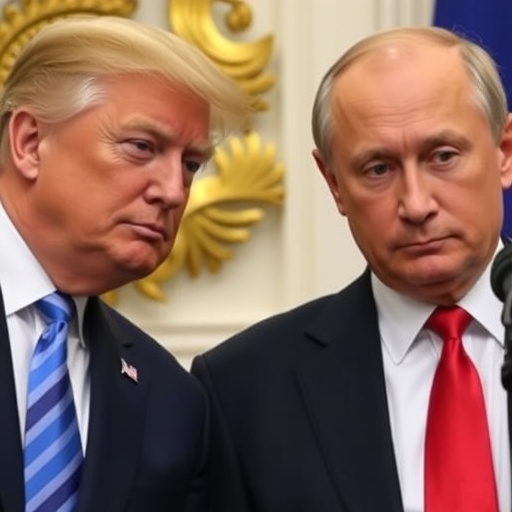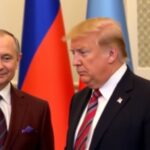Trump Calls Putin-Trump Unity Tunnel ‘Interesting’ as US-Russia Summit Speculation Intensifies
In a surprising twist amid escalating tensions in Eastern Europe, former U.S. President Donald Trump has described a bold Russian proposal for a ‘Putin-Trump Unity Tunnel’ beneath the Bering Strait as ‘interesting.’ The remark, made during a recent interview, comes as whispers of a potential US-Russia summit gain momentum, potentially reshaping global alliances. This tunnel idea, pitched as a symbolic bridge between the two superpowers, has ignited debates from Washington to Moscow, with Ukrainian President Volodymyr Zelensky swiftly dismissing it as a distraction from ongoing conflicts.
The Bering Strait, a narrow waterway separating Alaska from Russia’s Chukotka Peninsula, has long symbolized the divide between East and West. Now, it’s at the center of this audacious engineering and diplomatic concept, which could connect North America to Asia via an undersea passage. Trump’s positive nod to the idea has fueled speculation about renewed U.S.-Russia engagement, especially as the world watches the implications for the Ukraine war and NATO’s role.
Russian Proposal Emerges from Diplomatic Thaw
The concept of the Putin-Trump Unity Tunnel first surfaced in Russian state media last month, described by Kremlin insiders as a visionary infrastructure project aimed at fostering economic and cultural ties. Proponents argue it could facilitate trade routes worth billions, bypassing traditional shipping lanes vulnerable to Arctic ice melt and geopolitical disruptions. According to a report from the Russian Academy of Sciences, the tunnel would span approximately 55 miles, utilizing advanced tunneling technology similar to the Channel Tunnel between England and France.
Details of the proposal include high-speed rail links from Fairbanks, Alaska, to Magadan in Russia, with an estimated construction cost of $100 billion over 15 years. Russian Foreign Minister Sergey Lavrov hinted at the idea during a UN General Assembly side meeting, stating, ‘In times of division, bold connections can heal old wounds.’ This comes against the backdrop of strained US-Russia relations since the 2014 annexation of Crimea and the 2022 invasion of Ukraine, where sanctions have crippled bilateral trade to under $30 billion annually, down from $35 billion pre-2022.
Experts note that the Bering Strait’s strategic location has historical precedence; during World War II, it served as the Lend-Lease route for U.S. aid to the Soviet Union. Today, with climate change opening new Arctic shipping paths, the tunnel could position Russia as a key player in global logistics. However, environmental concerns loom large, with the World Wildlife Fund warning that construction could disrupt fragile ecosystems, including polar bear habitats and migratory bird routes.
Trump’s Endorsement Ignites Political Firestorm
Donald Trump’s characterization of the Putin-Trump Unity Tunnel as ‘interesting’ was delivered in a Fox News interview on Tuesday evening, where he elaborated, ‘Look, Vladimir and I always had a great relationship. This tunnel? It’s a big idea, connects us literally under the ice. Why not explore it?’ The former president, who has frequently praised Putin as a ‘strong leader,’ stopped short of full endorsement but suggested it could be a topic for discussion in any future US-Russia summit.
Trump’s comments have divided U.S. political circles. Republican allies like Senator Lindsey Graham called it ‘a creative way to reset relations,’ while Democrats, including House Speaker Nancy Pelosi, labeled it ‘tone-deaf’ amid Russia’s actions in Ukraine. Polling from Pew Research indicates that only 28% of Americans view improved U.S.-Russia ties favorably, with 62% citing the Ukraine conflict as a major barrier. Trump’s history with Putin, including the 2018 Helsinki summit where he appeared to side with the Russian leader over U.S. intelligence, adds layers to the speculation.
Economically, the tunnel could boost Alaska’s resource sector; the state exports $2.5 billion in oil and minerals yearly, and a direct link might increase that by 40%, per University of Alaska estimates. Yet, security hawks worry about espionage risks, with former CIA Director John Brennan tweeting, ‘A tunnel to Putin? That’s not unity; that’s vulnerability.’
Zelensky Rejects Tunnel as ‘Smoke and Mirrors’
Ukrainian President Volodymyr Zelensky wasted no time in rebuking the Putin-Trump Unity Tunnel proposal, calling it ‘a fantastical distraction from the real issues of aggression and occupation.’ In a video address from Kyiv on Wednesday, Zelensky stated, ‘While Russia bombs our cities, they dream of tunnels to the West. This is not diplomacy; it’s delusion.’ His dismissal underscores Ukraine’s precarious position, with over 500,000 troops mobilized and $100 billion in U.S. aid since 2022.
Zelensky’s stance aligns with broader European Union sentiments, where leaders like Germany’s Olaf Scholz have emphasized sanctions enforcement over symbolic gestures. The EU has invested €50 billion in Ukraine’s reconstruction, viewing any US-Russia thaw warily. In Ukraine, public reaction has been fiery; a Kyiv Post survey shows 85% of respondents see the tunnel idea as Russian propaganda to soften Western resolve.
Geopolitically, the proposal arrives as Ukraine pushes for NATO membership, a red line for Moscow. Zelensky’s team has lobbied for accelerated arms deliveries, including F-16 jets, amid reports of Russian advances in Donetsk. The tunnel’s mention feels particularly galling, as it evokes the 1939 Molotov-Ribbentrop Pact’s secret protocols that carved up Eastern Europe—another ‘unity’ gone wrong.
Kremlin’s Silence Fuels Summit Speculation
The Kremlin has remained coy on the timing of any US-Russia summit, with spokesman Dmitry Peskov saying only, ‘All options are on the table when it benefits peace.’ This noncommittal response has analysts buzzing about a possible Trump-Putin meeting if the former president regains influence, perhaps post-2024 elections. Russian media, like RT, has amplified the Unity Tunnel narrative, framing it as a counter to U.S.-led isolation.
Historical US-Russia summits, such as Reagan-Gorbachev in 1985, led to arms control treaties; today, talks might focus on Ukraine ceasefires or energy deals. Russia’s economy, strained by 7% inflation and a ruble at 90 to the dollar, could benefit from eased sanctions. Yet, Putin faces domestic pressures, with military casualties estimated at 300,000 by Western intelligence.
International observers, including the UN’s Antonio Guterres, urge caution: ‘Symbolic projects must not undermine justice for Ukraine.’ As speculation mounts, diplomatic channels report quiet backchannel talks, possibly involving Turkey as a mediator, given its role in Black Sea grain deals.
Visions of a Connected Future and Lingering Risks
Looking ahead, the Putin-Trump Unity Tunnel could symbolize a post-Cold War era if realized, potentially integrating supply chains and reducing global tensions. Proponents envision tourism booms and joint climate initiatives in the Arctic, where melting ice has already increased shipping traffic by 25% since 2010. For Trump, it fits his deal-making persona; for Putin, it’s a legacy project amid sanctions.
However, risks abound. Legal hurdles under the UN Convention on the Law of the Sea could delay progress, requiring bilateral agreements on territorial waters. U.S. Congress might block funding, with bills like the Arctic Security Act prioritizing defense over infrastructure. Indigenous groups in Alaska and Siberia voice concerns over cultural impacts, demanding consultations under the UN Declaration on the Rights of Indigenous Peoples.
If a US-Russia summit materializes, the Bering Strait tunnel might top the agenda, influencing everything from energy prices—U.S. LNG exports to Europe hit 80 billion cubic meters last year—to alliance dynamics. As world leaders monitor developments, the idea serves as a litmus test for whether unity can bridge divides or merely paper over them. With Trump’s ‘interesting’ label hanging in the air, the next moves from Washington, Moscow, and Kyiv will define the trajectory.








